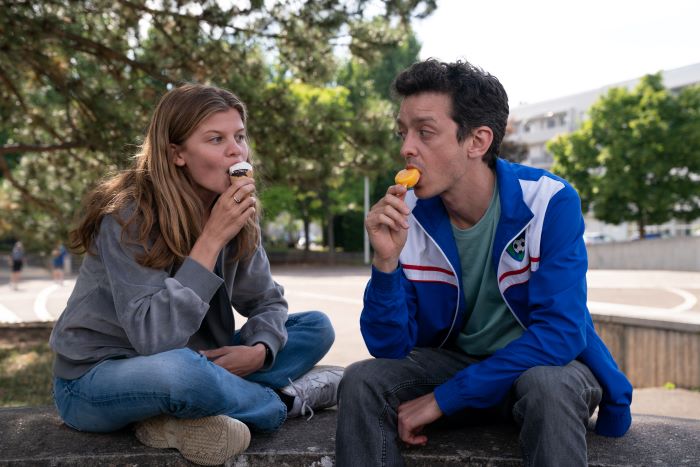Several entries in this year’s Rendez-Vous with French Cinema series provide a platform for new and emerging filmmakers to tell personal stories. The three films below—coincidentally, but fortuitously—are mature studies of single parents trying their best to raise children in often discordant circumstances.
All to Play For
Director Delphine Deloget makes her solo debut with this impassioned drama about a stressed-out single mom, Sylvie (Virginie Efira), who works late shifts as a bartender while raising her sons, preteen Sofiane and teenager Jean-Jacques. Despite her good intentions, her ability as a mother is called into question after Sofiane has an accident while she’s not at home, and that gets the slow, grinding wheels of France’s bureaucracy machinery to start moving, and she loses custody of her youngest son.
Most of the storyline comprises a devastated Sylvie’s ever more desperate attempts to reunite her family as she keeps butting heads with inefficient childcare agency workers who can’t—or won’t—help. Although it seems as if every roadblock and bit of red tape are being thrown in front of Sylvie, Deloget skirts mawkishness by contrasting Sylvie’s fierce commitment to her boys, no matter her mistakes or errors in judgment, with many of those in charge of supervising Sofiane, who are either disorganized or incompetent or both.
The superlative acting across the board includes wonderful work by young Alexis Tonetti as Sofiane and Félix Lefebvre as Jean-Jacques, both of whom are extremely believable. But it’s Efira—who seems to appear every year at this festival—who is the film’s heart. Efira (who’s also the primary reason to see another Rendez-Vous entry, Valérie Donzelli’s intriguing but ultimately conventional Just the Two of Us) gives a bracing and expressive portrayal that makes All to Play For a must-see.
No Love Lost
In another thoughtful study of a single parent, writer-director Erwan Le Duc’s sophomore film follows Étienne (Nahuel Pérez Biscayart) and his teenage daughter, Rosa (Céleste Brunnquell), who is planning to leave home to attend art college. Le Duc deftly paints a delicate portrait of a makeshift family haunted by the past in the form of Valérie (Mercedes Dassy), who left Étienne soon after Rosa was born and has not been heard from since. (The film opens with a witty, nearly silent sequence that introduces us to the brief but powerful sparks that flew between the couple.)
After Étienne sees his ex by chance in video footage on the TV news, Valérie—or rather the thought of her—becomes the main focus of both the father’s and daughter’s lives. Le Duc flirts with melodrama at times in how he presents the evolving father-daughter interaction, but the director provides a welcome corrective with the beautifully observed relationship that Rosa develops with her boyfriend, Youssef (Mohammed Louridi). Le Duc has also shot an eloquently suggestive ending that avoids the obvious pathos of father, daughter, and estranged mother meeting, however briefly. No Love Lost (the literal translation of the French title is the far blunter Her Father’s Daughter) is a clear-eyed look at shifting family dynamics, anchored by a pair of impressively lived-in performances by Biscayart and Brunnquell.
Toni
As the eponymous 43-year-old single mother of five who was a big-time, one-hit wonder at age 20, Camille Cottin is delightful in writer-director Nathan Ambrosioni’s equally likeable comic drama. Taking a cue from his harried heroine, Ambrosioni has made a closely observed study of a woman who, despite her history, lives in the moment, while many of those around her—including her mother, who was the one who pushed the reluctant Toni into the limelight a couple of decades earlier—keep reminding her that she was once a big deal.
The movie largely centers on Toni’s life choices and how she deals with a quintet of well-adjusted but still awkward teenagers—a couple of them on the cusp of fleeing mom’s nest to go to college. To vary the sameness of a life that has become all about routine, Toni ponders returning to school herself, which is met with bemusement by her kids and even ridicule by her mother. Ambrosioni not only gets the details of Toni’s daily life right, but also adroitly individualizes her kids, each of whom has his or her own difficulties dramatized effectively and plausibly, all of which further harries Toni, embodied with her usual winning complexity by Cottin.
In a lovely scene set in Toni’s car—the family must precisely schedule its every movement to school, work, or shopping since mom drives the only vehicle—her long-ago hit song comes on the radio, and her five children begin to sing along to it proudly. At first, Toni puts up with it reluctantly, but is soon happy to join in. It’s a small moment but one that underlines Cottin’s sensitive acting and Ambrosioni’s sympathetic lens.



















Leave A Comment